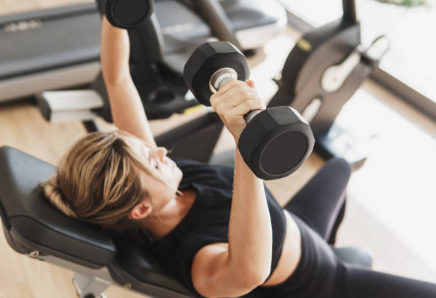Your metabolism plays a vital role in burning fat and is essential for your body’s ability to perform functions. Metabolism is a process that involves converting the food you eat into energy, achieving functions such as breathing and blood circulation.

However, factors such as your body size, gender, and age can help speed up or slow down your metabolism. For example, metabolism slows down as we age. Also, if you choose exercises that help boost your metabolism, you won’t necessarily burn more calories or lose weight. Here are 11 ways to improve your metabolism.
1. Perform Interval Training
Interval training, such as high-intensity interval training (HIIT), is one way to boost your metabolism. This type of training can help you absorb more oxygen and make your mitochondria (the small organs with cells that help provide energy to your cells) burn energy harder.
When you’re running, swimming, or cycling, try picking up your pace at 30-second intervals before returning to your normal pace. However, make sure you don’t overdo interval training. Too much interval training can reduce mitochondrial function, glucose tolerance, and insulin release.
2. Engage in Strength Training
Resistance training, also known as strength training, is also an important way to improve metabolism, strength, and endurance. Building muscles through physical activities such as strength training can help speed up metabolism because fat burns fewer calories compared to muscle.

However, the key is to keep your muscles active to achieve metabolic benefits. As part of your weekly workout, you can add strength training sessions to help your metabolism and make yourself stronger.
3. Eat Enough Calories
When you eat significantly fewer calories than normal, your body adapts to consuming fewer calories. This adaptation does not help metabolism.
To prevent your metabolism from slowing down during weight loss, you need to make sure you’re eating enough calories that at least match your resting metabolic rate (RMR). You can test your RMR at an RMR testing site near you and work with a registered dietitian to help determine your calorie needs.
4. Keep Exercising
Post-exercise excess oxygen consumption (EPOC) occurs when your body needs a period of time to recover from strenuous exercise and return to its previous RMR. During this time, even if you stop exercising, your body will burn more calories than usual.
However, the high-calorie burning won’t last that long. You will be back to RMR about an hour after your workout. Conversely, regular, intentional exercise, combined with a balanced diet, can help you get the most out of your metabolism.
5. Avoid Trans Fats
Trans fats are not only bad for the heart, but they also reduce the body’s ability to burn fat. Trans fats negatively affect the way your body metabolizes essential macronutrients, such as lipids and fatty acids in your blood.
Consuming trans fats can lead to insulin resistance and inflammation – two factors that have been linked to diseases related to metabolic issues such as diabetes and obesity. Foods high in trans fats include many commercial baked goods and fried foods.
6. Eat More Protein
Your body needs more time to break down protein than fat or carbohydrates, so you’ll end up feeling fuller for longer. Protein can also help boost metabolism through a process called thermogenesis, in which your body devotes about 10% of its calorie intake to digestion.

Since it takes longer to burn protein than it does to burn carbohydrates or fat, your body uses more energy to absorb the nutrients from a high-protein diet. A quick way to get more protein is to add whey to your smoothie. Whey has a stronger fat oxidation (the process of breaking down fatty acids) and thermal effects (extra energy that the body needs during digestion) than soy or casein.
7. Drink Coffee
Caffeine speeds up your central nervous system, which boosts your metabolism. What’s more, coffee can give you energy and antioxidants.
Coffee can also boost energy levels during exercise, helping you work harder, longer, and burn more calories in the process. However, caffeine has little of a metabolism-boosting effect, so you may not notice any change in your weight.
8. Drink Green Tea or Oolong Tea
Green tea and oolong tea may also help boost metabolism. Studies have shown that both teas can help you burn more fat. Unfortunately, the fat-burning effect of tea is not strong enough to affect a person’s weight.
9. Stand More
If possible, standing may benefit your metabolism, or if you’re sitting for long periods of time, just walking around. Whenever you are physically active and moving, you can burn more calories than if you were still or sitting.

10. Try to Decompress
One of the benefits of less stress is a better metabolism: studies have shown that when you’re stressed, your metabolism stops. There are several possible reasons for this, but one of them is that chronic stress stimulates the production of β-trophic factors, β which are proteins that inhibit enzymes needed to break down fats.
Stress reduction may not always be easy, but it is achievable in some cases. You can reduce stress by doing something you enjoy but relaxing, such as reading a book or going for a walk.
11. Get Plenty of Sleep
Studies have found that sleep is important for regulating metabolism. The results of one study showed that after a few days of sleep deprivation, study participants felt less full after eating and had a different metabolism of fats in food. While getting enough sleep doesn’t boost metabolism completely, it can prevent weight gain.
It is recommended that adults get at least seven hours of sleep per night. If you’re having a hard time getting seven hours of sleep a night, try to develop a new bedtime routine that will help you get a full night’s sleep.
Summary
Your metabolism may be affected by different factors, but it can be boosted. Regular exercise, including activities such as strength and interval training, changes to diet, and getting enough sleep are all potential ways to improve metabolism.